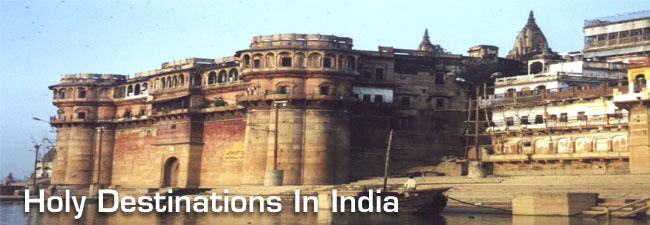 Gangotri
Gangotri
The Eternal Gift Of Bhagirath's Penance
Be it man's urge to placate the Gods above or to quench his
desire for adventure, Gangotri is an ideal location. Gangotri,
the origin of the sacred river Ganges, attracts tourists in
large numbers every year. The confrontation with the daunting
rivers and attempts to unravel the mysteries of the supernatural
world are ubiquitous sights here. Along with the thrill of conquering
nature, what one experiences here is the mystical aura that
India is so famous for.
Location And Access
Location - Couched in the magnificent Garhwal hills, Gangotri
is at an altitude of 3048 meters above sea level. It is on the
northernmost part of the state of Uttar Pradesh and is very
near the Indo-Tibetan border. It is approximately 300 km from
Dehradun, 250 km from Rishikesh and 105 km from Uttarkashi.
The summers are relatively cool and winters are freezing cold,
with rains in the months of May and June. For the devotees and
tourists, the gates of the temple are open only in the months
of May to November.
Altitude: 3042 mts.
Climate: Summer - Cool during the day and cold at night.
Winter - Snow-bound. Touching sub-zero.
Accessibility
Airport Jolly Grant, Dehradun 226 km
Railhead Rishikesh, 249 km
Road Well connected to Rishikesh, Haridwar, Dehradun and Delhi.
Mythological Legend
According to an old legend, Lord Shiva rewarded King Bhagirath
after his penance and Ganga came down to earth. However, due
to her pride, and the fact that the earth would be devastated
if Ganga came down in her full force, Lord Shiva caught her
in his locks. It was then proclaimed that Goddess Uma or Parvati,
Shiva's consort, would bathe in the Ganges daily and only then
would she descend on the earth. The sacred stone near the temple
denotes the place where Ganga first came down to earth. This
is why Ganga is also called by the name of Bhagirathi.
Mythological Mystery
According to mythology, Goddess Ganga- the daughter of heaven,
manigested herself in the form of a river to absolve the sins
of King Bhagirath's predecessors, following his severe penance
of several centuries. Lord Shiva received into his matted locks
to minimise the immense impact of her fall. She came to be called
Bhagirathi at her legendary source.
A long the right bank of Bhagirathi stands the shrine of Gangotri
dedicated to the Goddess. Perched at a height of 3042 mts.,
it was constructed in the early 18th century by a Gorkha Commander,
Amar Singh Thapa. Every year, lakhs of pilgrims throng the sacred
temple between May and October. By November, Gangotri is covered
by snow. It is believed that the Goddess retreats to Mukhba,
her winter abode.
Unique Pilgrimage Attraction
Submerged Shivling
The natural rock Shivling, submerged in the river, is an amazing
sight reinforcing the power of the divine. According to mythology,
Lord Shiva sat at this spot to receive the Ganaga in his matted
locks. The Shivling is visible in the early winters when the
water level goes down. The picturesque pilgrimage in the hinterlands
of the Himalayas is the most sacred spot where Ganga, the stream
of life, touched earth for the first time.
Prime Pilgrimage Attraction
Gangotri Temple
The 18th century's temple dedicated to Goddess Ganga is located
near a sacred stone where King Bhagirath worshipped Lord Shiva.
Ganga is believed to have touched earth at this spot. According
to another legend, Pandavas performed the great 'Deva Yagna'
here to atone the deaths of their kinsmen in the epic battle
of Mahabharata. The temple is an exquisite 20 ft. High structure
made of white granite.
Excursion
Nandanvan Tapovan
An arduous trek along the Gangotri Glacier leads to scenic
Nandanvan - the base camp for the Bhagirathi peaks, that offers
a panoramic view of the surrounding Shivaling peak. A trek across
the snout of the Gangotri Glacier leads to Tapovan known for
its beautiful meadows that encircle the base of the Shivling
Peak.
Uttarkashi (99 km)
An important pilgrimage centre, situated at an elevation of
1,150 mts. above sea level on the bank of river Bhagirathi.
Some of the important temples worth visiting are - Vishwanath
temple, Ekadash Rudra temple, Gyaneshwar temple and Kuteti Devi
Temple. Nearby is the Nehru Institute of Mountaineering. Every
year, during the 'Magh Mela' people visit Uttarkashi to take
a holy dip in Bhagirathi along with the image of their village
deity.
Kedar Tal (18 km)
An enhancing lake, 4425 mts. above sea level against the splendid
backdrop of mighty Thalaiyasagar peak. Accessible through a
rough mountain trail, it is the base camp for trekking to surrounding
peaks. The trek to Kedartal needs a local guide.
Gaumukh (18 km)
The snout of the Gangotri Glacier and the source of the Bhagirathi
river. Pilgrims trek upto the sacred spot on foot or on ponies
to take a holy dip in the ice-cold water.
Dayara Bugyal (93 km)
A breathtakingly beautiful meadow, situated at a height of
3,048 mt above sea level. A motorable road connects Bhatwari
(27 km from Uttarkashi) with Raithal village, from where follows
a 6 km Long trek to Dayara. The famous Sheshnag Temple enroute
is an attraction of the trek. From Dayara, one can also trek
down to Dodi Tal (30 km). During winters, Dayara provides excellent
ski slopes over an area of 28 sq. km
Nachiketa Tal (131 km)
A pleasant trek through lush green forests leads to this peaceful
retreat. A small temple along the lake and lovely surroundings
are an attraction.
Tehri (173 km)
Lying at the confluence of Bhagirathi and Bhilangna rivers
is the former capital of Tehri Garhwal principality. It is the
site of a giant hydel project.
Narendranagar (239 km)
The new capital of erstwhile Tehri state, offers a magnificent
view of the Ganga valley of Rishikesh and the plains of Haridwar.
